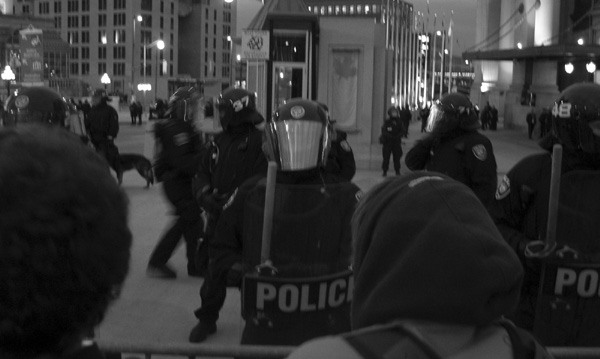This is the (working) session description:
As Richard Ericson has argued, a recent trend in policing and security work is to treat allegedly suspicious acts as criminal matters, leading to what he calls “criminalization of the merely suspicious”. Criminalization of the merely suspicious occurs when policing and security agencies preemptively regulate what they define as possible risks under the auspices of criminal law even though the acts targeted may be legal and protected under Canada’s Charter or similar guarantees in other countries. In particular, this panel seeks papers documenting cases where acts deemed problematic by the authorities become encoded or treated as criminal or even “terrorist” as part of such a process. We are interested in papers showing how such criminalization and accompanying surveillance measures are asymmetrically targeting those who pose a challenge to dominant economic and political agendas.
I have submitted the following abstract:
“A Mechanism to Remove Individuals Who Pose a Threat to National Security”: Security Certificates and the Criminalization of the Merely SuspiciousIn his discussion of the contemporary politics of uncertainty, Richard Ericson draws our attention to the growing trend of criminalizing the merely suspicious. At the heart of this trend is a proliferation and normalization of security measures intended to "preempt imagined sources of harm" (Ericson 2007). This paper explores the contemporary Canadian immigration security certificate mechanism as a case study in the politics of uncertainty. Political-discursive and concrete legal processes are discussed. Official government discourse about security certificates is characterized by a valuation of precautionary action against non-citizens on the basis of categorical suspicion. Certificates are applied through an executive act of “deeming” (Butler 2004) that translates suspicion into a finding of threat. In concrete terms, this involves the use of “counter-law” (Ericison 2007) to arrest and detain individuals through a process that employs coercive means but carefully avoids the traditional criminal justice system – and its associated safeguards. The paper concludes by discussing the ways in which security certificates and other mechanisms associated with the new politics of uncertainty recognize and reinforce pernicious binary distinctions between ‘good citizens’ and ‘threatening others’.
The paper itself seems pretty straightforward. I envision four sections. In the first section, I will offer a brief introduction of the security certificate mechanism, and a short overview of recent developments related to it. I'd like to conclude this section by reflecting on the nature of the term "criminalization of the merely suspicious" - in particular, I'd like to emphasize the fact that the processes that fall under this concept do not necessarily correspond to criminalization as it is traditionally understood and criminology. In fact, many cases involve the deliberate circumvention of the traditional criminal justice system. and more appropriate term might highlight the "threat-itization", the "securitization [though this term is already widely used and means something different]", or simply the "official stigmatization and control" of the merely suspicious. I'm not saying that we should change the term, but it's worth noting that are very understanding of what "criminalization" means requires significant refinement. I think that Ericson recognized this in his book.
In the second section, I would like to explore the "criminalization of the merely suspicious" through the lens of official state discourse about security certificates, and particularly in the C-3 debates. I might go so far as to describe these discourses as reflective of a new mentality of governance, complete with its own rules, logics, and speech acts. On this last point, I will draw on Waever's argument that 'security' utterances are acts in and of themselves. This is easy to illustrate given the declarative nature of security certificates.
In the third section, I will explore some of the concrete legal and counter-legal measures that are in place to translate discursive categorizations of suspicion into sanctioned coercive force. I will briefly discuss the way that C-3 constructs legal grey holes, the ways in which intelligence -which is all about suspicion - replaces evidence in security certificate cases, and the way the immigration law in general is used in this context to circumvent the criminal justice system.
The fourth and concluding section will recap, and exercised the need to understand the criminalization of the merely suspicious as a governing mentality and a set of counter-legal processes. It will also highlight the uneven application of these discourses and processes in the contemporary Canadian context; it is important to note that this particular set of precautionary measures is applicable only to non-citizens. The politics of uncertainty are revealed as a biopolitics of exclusion.
Again, comments and suggestions are welcome.

No comments:
Post a Comment